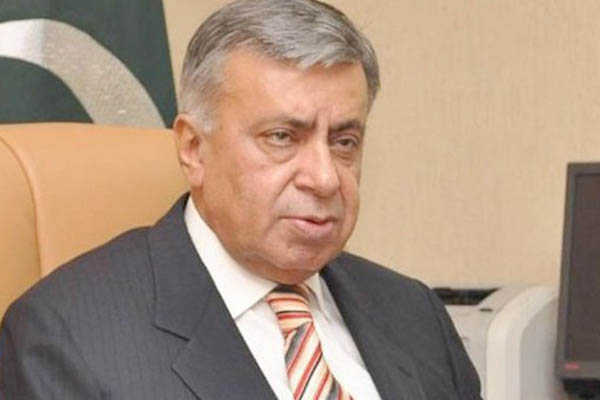
File photo of Arif Nizami
The senior journalist passed away in Lahore on July 21 while admitted to private hospital
The passing away of Arif Nizami (Oct. 14, 1948–July 21, 2021) in Lahore a few weeks after suffering a heart attack has deprived Pakistan of a highly rated journalist who rose to prominence from the background of a rightwing-conservative newspaper industry. He was able chart his own course and be recognized as a liberal thinker with command over both English and Urdu idioms. He began his career in Urdu journalism on the editorial board of Nawa-e-Waqt, a supporter of the Pakistan Movement, started by his father Hamid Nizami.
Hamid Nizami was a charismatic person leading the students’ movement in favor of yet-to-be-formed Pakistan. He was elected president of the Punjab Muslim Student’s Federation twice in the 1940s. He was also able to convert his fortnightly Nawa-e-Waqt into a weekly and later a daily, becoming a legendary champion of the Pakistan Movement. After Hamid’s demise when Arif was just 16, his uncle Majid Nizami took over the reins. In 1986, Arif was made editor of daily The Nation, the English-language version of Nawa-e-Waqt.
In 2009, Arif left The Nation and founded daily Pakistan Today in 2010. He was widely acknowledged as one of the top opinion-makers in the English-language press. His integrity of character and moderation of views made him popular; and he served as a minister in a caretaker government in 2013. In 2015, he became CEO of TV Channel-24 and hosted a political talk-show Debate News Analysis. He also hosted a current affairs show on Samaa TV apart from appearing as a guest discussant on many other channels.
Coming from a conservative background that tended to recede into the background as Pakistan progressed to liberal politics, Arif convinced his uncle Majid to enter into English-language journalism to compete with daily The News that had been launched in Lahore. Editor Arif chose his editorial team of three carefully, none of them conservative in outlook: Khaled Ahmed, Asghar Butt and Anjum Ibrahim, the last-named now a notable economic commentator on Aaj TV. There was some measure of opinion-control over The Nation by Chief Editor Majid Nizami, which Arif fended off as best he could without taking on his uncle frontally. He left the skeleton newspaper The Nation after its decline under his rather static uncle.
Just before his demise, Arif’s editorials reflected his worldview in his online publication Daily Pakistan. This is what he wrote about Prime Minister Imran Khan’s budget for FY2021-22: “Perennially in the self-congratulating mode, Khan also declared the other day that his critics had declared him a failure. However, he proved them to be wrong. Comparing himself to Jinnah, the founder of the nation, he incredibly claimed: I, in the same manner in which the Quaid was forced to leave the country in disgust, later to return and resume his struggle for Pakistan. Any revival of the economy will require a reform agenda that has to be chalked out sooner than later.
“But changing the fundamentals by bringing about a structural change is a herculean job. This could also be a perfect opportunity for the P.M. to demonstrate that his Naya Pakistan is not merely slogan-mongering. Leader of the opposition Shahbaz Sharif not too long ago spoke about reaching an economic concord. Presumably he meant consensus building on economic issues. Easier said than done. He has to bring his own rank-and-file on board starting from the elder Sharif who still runs the show from London to former finance minister Ishaq Dar who has his own ideas about how to run the economy.”
Arif’s foreign policy insight is expressed in another article he wrote before his demise, Writing on the Wall: “Chief of Army Staff Gen. Qamar Javed Bajwa had the honor of calling upon the Saudi crown prince and de facto ruler Mohammad bin Salman, popularly referred to as MBS. The very next day Prime Minister Imran Khan also joined in the second high level meeting between the Saudi and Pakistani leadership. During the meeting with the COAS, ‘matters of mutual interest, regional security situation including recent developments in Afghan Peace process, bilateral defense security activity, collaboration for regional peace and connectivity’ were discussed.
“Notwithstanding the homilies and platitudes usually expressed on such occasions, is it really a new beginning for frayed Saudi Pak relations during the past year or so? Islamabad’s ties with Riyadh had hit an all-time low thanks to the infantile behavior of our foreign minister Shah Mehmood Qureshi who openly complained about the Saudis stance on Kashmir perceived as lukewarm by Islamabad.
“Beggars cannot be choosers; flush with newfound glory the young Saudi ruler promptly pulled the plug on part of the virtually free money lent out to Pakistan. Adding insult to injury, Islamabad tried, albeit unsuccessfully, to spearhead an anti-OIC group sponsored by Malaysia’s Mahathir Muhammad. Khan has already crossed the Rubicon so far as his tenure is concerned. Now it seems the mid-term blues have taken over. Perhaps here is a somewhat belated realization that the PTI has failed to deliver on most of the tall promises it had made to the electorate before elections time.”
